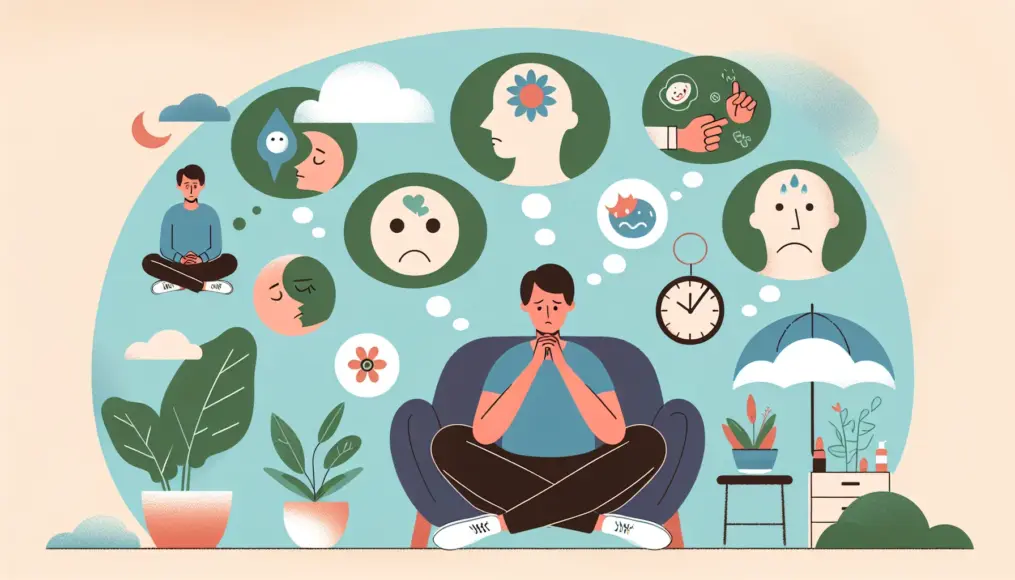In our daily lives, managing our emotions is crucial. Especially during moments of stress and anxiety, knowing how to navigate your feelings can help you maintain peace of mind. In this article, we’ll explore specific methods to understand and effectively control your emotions.
By taking steps to comprehend the role of your emotions, you can gain deeper self-awareness. Additionally, incorporating psychological approaches and practical techniques can make it easier to manage your feelings in everyday situations. Now is a great opportunity to reflect on your emotional landscape.
Filled with tips for nurturing your mental well-being and enjoying a more comfortable daily life, this article invites you to stay with us until the end.
- Learn about the importance of recognizing and understanding emotions
- Methods that incorporate mindfulness and cognitive behavioral therapy
- Techniques you can practice in your daily life
Understanding Your Emotions: The Basics
To effectively manage your emotions, it’s crucial to first understand what you’re feeling. Our emotions significantly influence our actions and thoughts. By recognizing what emotions you’re experiencing and the roles they play, you can gain better self-control. In this section, we’ll explore the functions of emotions and outline steps to help you recognize them.
Understanding your emotions can enhance your ability to cope with everyday stress and anxiety. By being honest with yourself about your feelings and adopting appropriate coping strategies, you can achieve greater emotional stability. Let’s start by considering the role of emotions.
What Role Do Emotions Play?
Emotions serve various functions in our lives. Feelings like joy, sadness, anger, and fear are key elements that shape how we respond to different situations. Emotions help us detect danger and facilitate communication with others.
Moreover, emotions provide clues for deeper self-understanding. By recognizing how you feel in different circumstances, you can gain insights into yourself and create opportunities for personal growth.
- Emotions influence actions and thoughts.
- Different emotions dictate responses to situations.
- They serve as clues for deeper self-understanding.
Steps to Recognize Your Emotions
To recognize your emotions, it’s essential to pay attention to how you feel. Make it a habit to consciously observe your emotional state throughout your daily life. Keeping a journal or tracking your emotional changes can be particularly effective.
Next, it’s important to consider the underlying causes of your emotions. Understanding what triggers certain feelings can lead to a deeper self-awareness. By recognizing and analyzing your emotions, you can enhance your ability to manage them.
If you’d like to delve deeper into understanding and controlling your emotions, check out this article on “How to Effectively Manage Your Emotions.” This resource offers practical techniques that can help you better manage your emotions and reduce stress and anxiety in your daily life.
- Observe your feelings.
- Keep a journal to record your emotions.
- Reflect on the causes of your emotions for deeper understanding.
Mastering Your Emotions Through Psychological Approaches
When it comes to managing your emotions, psychological strategies can be incredibly effective. Techniques like cognitive behavioral therapy (CBT) and mindfulness serve as powerful tools to help you understand and regulate your feelings. By utilizing these methods, you can reduce stress and anxiety, leading to a more positive mindset. In this section, we’ll delve into the fundamentals of cognitive behavioral therapy and explore ways to calm your emotions through mindfulness.
Incorporating psychological insights into your daily life can enhance your ability to tackle emotional challenges. We encourage you to give these approaches a try to gain better control over your feelings.
The Basics of Cognitive Behavioral Therapy
Cognitive behavioral therapy is a method for understanding how our thoughts influence our emotions and behaviors. This therapy focuses on reevaluating negative thought patterns and transforming them into more constructive ways of thinking. Recognizing your thought patterns and taking steps to improve them is crucial.
For instance, instead of thinking “I’m a failure” after making a mistake, try reframing that thought to “I can do better next time.” This shift in perspective can help you maintain a more positive outlook. By leveraging cognitive behavioral therapy, you’ll find it easier to manage your emotions.
- Cognitive Behavioral Therapy helps you understand the relationship between thoughts and emotions
- Reevaluate negative thoughts and shift to constructive thinking
- Recognizing and improving your thought patterns is key
Calming Your Emotions with Mindfulness
Mindfulness is a technique that encourages you to focus on the present moment, which can help you calm your emotions. By concentrating on your breath or tuning into your surroundings, you can organize your feelings more effectively. This practice can lead to a reduction in stress and anxiety, promoting a sense of mental stability.
Incorporating mindfulness into your daily routine is quite simple. For example, taking a few minutes for deep breathing or paying attention to the sounds and sights around you during a walk can be very effective. These practices can help reset your mindset and foster positive thinking.
If reading this article has sparked your interest in emotional control, we recommend checking out this article on “Practical Methods and Techniques for Controlling Emotions”. It offers specific techniques to alleviate stress and anxiety while encouraging a more positive way of thinking. You’ll find new strategies to help you manage your feelings effectively.
- Mindfulness is a technique that focuses on the present moment
- Organizing your emotions through breath awareness
- Simple ways to incorporate it into daily life
Managing Emotions with Practical Techniques
To effectively manage your emotions, it’s essential to incorporate practical techniques into your daily routine. By learning simple methods that can be easily executed in everyday life, you can reduce stress and anxiety while maintaining a positive outlook. This section will delve into stress reduction through breathing techniques and offer tips for cultivating positive thinking as a habit.
By practicing these techniques, you’ll be better equipped to manage your emotions. So why not give them a try in your daily life?
Reducing Stress with Breathing Techniques
Breathing exercises are an incredibly effective way to gain control over your feelings. Taking deep breaths ensures that your body receives ample oxygen, leading to a relaxing effect. When you’re feeling stressed or anxious, it’s important to consciously regulate your breathing.
A simple approach is to find a quiet spot, sit down, and slowly inhale through your nose. Then, exhale gently through your mouth. By repeating this process several times, you can calm both your mind and body. The beauty of breathing techniques is that they can be practiced anytime, anywhere, making them a highly convenient tool.
- Breathing exercises are effective for stress relief
- Deep breathing promotes relaxation
- Easy to practice anywhere
Cultivating a Habit of Positive Thinking
Establishing a habit of positive thinking is crucial for emotional control. By consciously seeking out the positive aspects of your daily life, you can diminish negative feelings. One effective practice is to write down three things that went well each day before you go to bed.
Focusing on positive experiences fosters gratitude and contributes to emotional stability. Additionally, sharing positive topics with friends and family can have a beneficial impact. By intentionally making positive thinking a habit, you enhance your self-esteem and find it easier to manage your emotions.
- Positive thinking is key for emotional control
- Develop the habit of writing down “good things” each day
- Sharing positive topics brings about good influences
Managing Your Emotions in Everyday Life
Managing your emotions in daily life is crucial for maintaining mental well-being. By incorporating routines into your daily activities, you can achieve a more stable emotional state. Additionally, having the courage to seek support when needed can greatly enhance your emotional control. This article will delve into the benefits of establishing routines and the importance of reaching out to those around you for support.
By practicing these methods, you can reduce stress and anxiety, leading to a more balanced and fulfilling life. So, why not give them a try in your daily routine?
Establishing Routines for a Stable Life
Creating a routine in your daily life makes it easier to manage your emotions. Waking up, eating, and exercising at the same time each day helps align your mind and body, fostering emotional stability. A well-structured morning routine, in particular, can set a positive tone for the day ahead.
Moreover, having a routine clarifies what you need to do, which can help alleviate stress. Finding a routine that works for you and integrating it into your everyday life is key.
- Routines help align your mind and body
- They contribute to stress reduction
- Start your day with a positive mindset
The Courage to Seek Support
Sometimes, controlling your emotions requires reaching out to others for support. Everyone faces challenging situations, and having someone to listen or lend a helping hand can be a significant source of strength. Opening up to friends or family can help you process your feelings.
Consulting a professional can also be a valuable option. Through counseling or therapy, you can receive specific advice on managing your emotions. Seeking support is a sign of strength and a vital step in maintaining emotional health.
- It’s important to seek support from those around you
- Having someone to talk to can be a source of comfort
- Professional help is also an option worth considering
Conclusion
Managing your emotions is crucial for maintaining mental health. In this article, we explored how to understand emotions and discussed various psychological approaches and practical techniques for managing feelings in everyday life. We learned that establishing routines can lead to a more stable life, and having the courage to seek support from those around us can greatly aid in emotional regulation.
Additionally, by incorporating breathing exercises and positive thinking into our daily habits, we can reduce stress and anxiety, paving the way for a richer, more fulfilling life. Let’s put these strategies into practice and work towards better emotional management.
- Understanding and controlling emotions is vital for mental health
- Establishing routines can lead to a more stable life
- Seeking support and practicing positive thinking are effective for emotional management
Let’s cherish our feelings and strive to improve our daily lives. If you have any thoughts or questions about this article, feel free to drop a comment!












































Comment